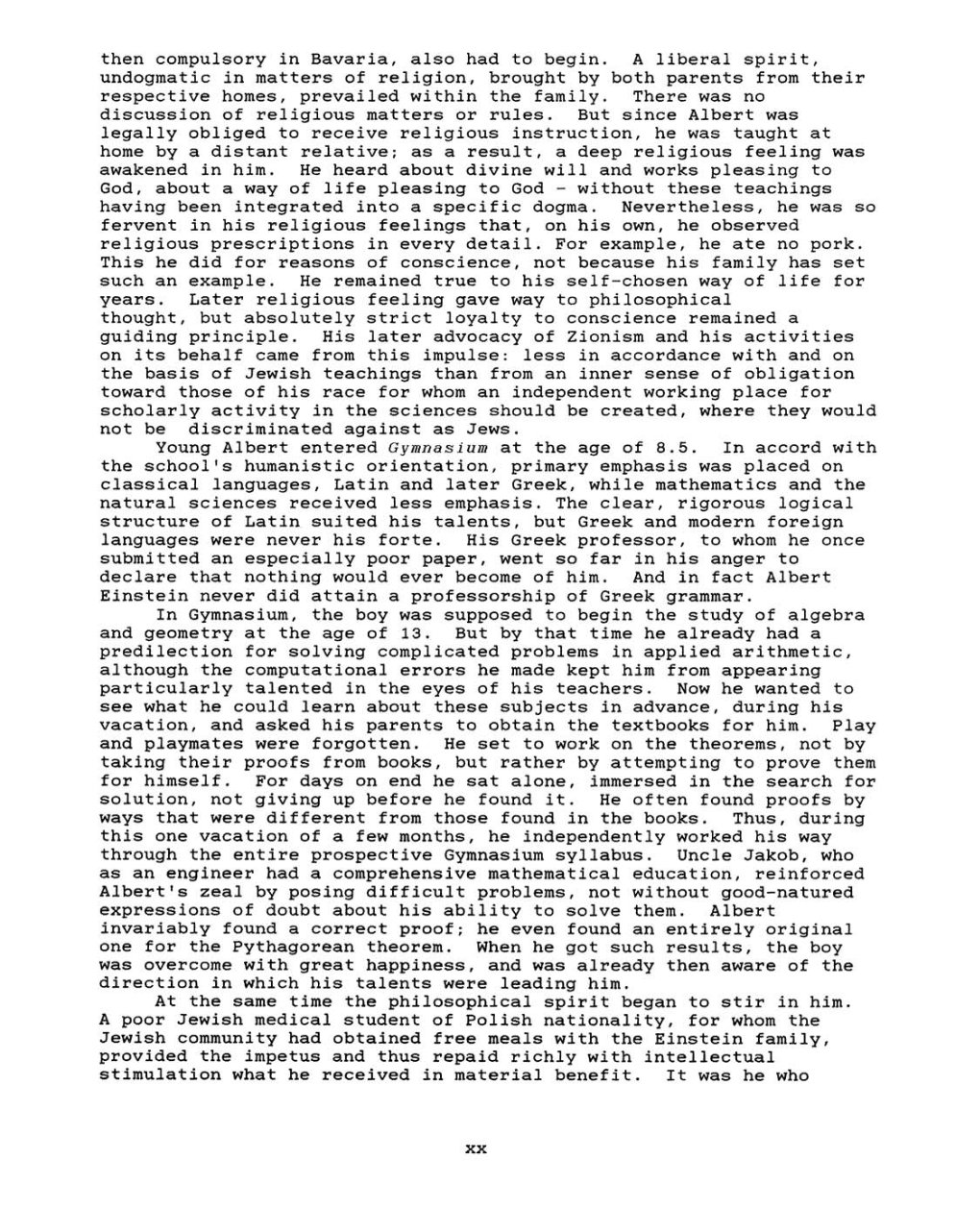then
compulsory
in Bavaria, also had
to
begin.
A
liberal spirit,
undogmatic in matters of religion, brought by both parents from their
respective
homes,
prevailed
within the
family.
There
was
no
discussion of
religious
matters
or
rules. But since Albert
was
legally obliged
to receive
religious instruction,
he
was
taught at
home by
a
distant relative;
as a
result,
a
deep religious feeling
was
awakened in him. He heard about divine will and works pleasing
to
God, about
a
way
of life
pleasing
to
God
-
without these teachings
having
been
integrated
into
a
specific dogma. Nevertheless,
he
was so
fervent in his
religious feelings
that,
on
his
own,
he observed
religious prescriptions
in
every
detail. For example, he ate
no
pork.
This he did for
reasons
of
conscience,
not
because his family has set
such
an
example.
He
remained true
to
his
self-chosen
way
of life
for
years.
Later
religious
feeling
gave way to
philosophical
thought,
but
absolutely
strict
loyalty
to conscience remained
a
guiding principle.
His later advocacy of Zionism and his
activities
on
its behalf
came
from this
impulse:
less in accordance with and
on
the basis of Jewish teachings than from
an
inner
sense
of obligation
toward
those of his
race
for whom
an
independent working place for
scholarly activity
in the sciences should be created, where
they
would
not
be discriminated against
as
Jews.
Young
Albert entered
Gymnasium at
the
age
of 8.5. In accord with
the school's humanistic orientation, primary emphasis
was
placed
on
classical
languages,
Latin and later
Greek,
while mathematics and the
natural sciences received less
emphasis.
The clear,
rigorous logical
structure of Latin suited his talents, but Greek and modern
foreign
languages
were never
his forte. His Greek professor,
to
whom he
once
submitted
an
especially
poor paper,
went
so
far in his
anger
to
declare that nothing would
ever
become of
him. And in fact Albert
Einstein
never
did attain
a
professorship
of Greek
grammar.
In
Gymnasium, the boy
was
supposed
to
begin the study of algebra
and geometry at the
age
of
13.
But by that time he already had
a
predilection for
solving
complicated problems in
applied
arithmetic,
although the computational
errors
he made
kept
him from
appearing
particularly
talented in the
eyes
of his teachers. Now he wanted
to
see
what he
could learn about these
subjects
in advance,
during
his
vacation, and asked his
parents
to
obtain the textbooks for him. Play
and playmates
were
forgotten. He set to work
on
the theorems, not by
taking their
proofs from books, but rather by attempting to
prove
them
for himself. For
days
on
end he sat alone, immersed in the search for
solution,
not
giving
up
before he found it. He often found proofs by
ways
that
were
different from those found in the books. Thus, during
this
one
vacation of
a
few
months,
he
independently
worked his
way
through the entire
prospective
Gymnasium syllabus.
Uncle Jakob, who
as an
engineer
had
a
comprehensive
mathematical education, reinforced
Albert's zeal by posing
difficult
problems,
not without good-natured
expressions
of doubt about
his ability
to solve
them.
Albert
invariably
found
a
correct
proof; he
even
found
an
entirely original
one
for the
Pythagorean
theorem. When he got such results, the boy
was
overcome
with
great
happiness, and
was
already then
aware
of the
direction in which his talents
were
leading him.
At
the
same
time
the
philosophical
spirit began to stir in him.
A
poor
Jewish medical student of
Polish
nationality,
for whom the
Jewish community had obtained
free meals with the Einstein
family,
provided the impetus and thus repaid richly
with intellectual
stimulation what he received in material
benefit.
It
was
he who
xx
